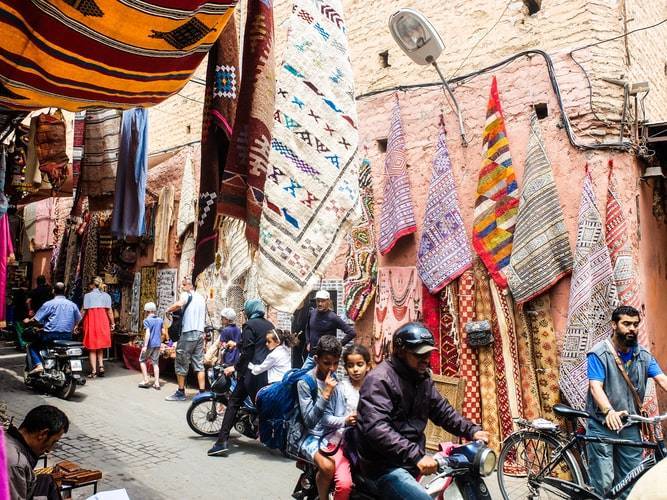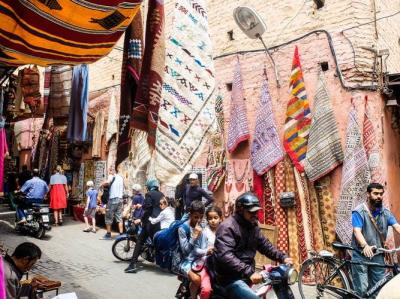Under the title ""Delta" Sneaks into Morocco: Urgent Measures and Monitoring of 4 Dangerous Outbreaks," Sky News reported that health authorities in Morocco are racing against time to combat the mutated version of the coronavirus known as "Delta," following the discovery of three hotspots for the new variant. Two hotspots were identified in Casablanca (the economic capital) and one in Kenitra, about 35 km from Rabat.
**State of Alert**
According to sources from "Sky News Arabia," the state of alert initiated by the authorities came after social media users shared information confirming the emergence of three hotspots in Casablanca for the Indian Delta variant, and a fourth in Kenitra, as stated by Professor Moulay Said Afif, a member of the scientific committee. The health authorities have taken all necessary sanitary measures to contain the spread of infections with this variant, which spreads 70% more rapidly than the British variant.
A member of the vaccination scientific committee revealed in May that the first case of the Delta variant in Morocco was recorded in an Indian citizen residing in the kingdom, while a second case was detected in one of his contacts. Afif further mentioned that both cases were found in Casablanca before flights to India were suspended, and the infected individuals were transferred to Moulay Youssef Hospital for necessary treatment and medical care.
It was noted that over 17 individuals who came into contact with the confirmed cases were placed under medical observation, with laboratory tests confirming they did not contract the "Indian variant."
On Thursday, authorities reported 789 new COVID-19 infections, with 525 recoveries and two deaths in the past 24 hours. The number of individuals who received the first dose of the COVID-19 vaccine reached 10,028,791, while those who received the second dose totaled 9,140,785.
**Non-Compliance Issue**
In this context, Dr. Tayeb Hamdi, a medical researcher in health policies and systems, stated regarding the Indian "Delta" variant that two cases had been officially announced in Casablanca for over a month and a half. These cases involved a Moroccan citizen returning from abroad and a foreign resident in Morocco, both of whom had contacts placed under health quarantine to manage the situation.
Hamdi confirmed that there are currently three hotspots for the Indian "Delta" variant in Casablanca and one in Kenitra, indicating that these hotspots are linked to individuals arriving from foreign countries who were detected as infected with the "Delta variant". He emphasized that any rapidly-spreading variant can enter all countries of the world and that no country has the ability to prevent the entry of viruses and variants.
Hamdi added that no country is immune to the pandemic or capable of stopping the virus or its original strain from entering. He noted that while discussing this variant, we refer to confirmed cases; however, many others may go undetected, especially in communities that do not respect individual or collective preventive measures, leading to rapid spread.
**Avoiding the Worst**
Hamdi stressed the importance of adhering to precautionary measures to ensure comprehensive protection, recommending avoiding unnecessary travel and gatherings, minimizing contact, properly wearing masks, using sanitizers continuously, and respecting social distancing. He mentioned that if the community adheres to these measures, it can combat the variant, as it would not find a suitable environment to spread.
He warned that failure to implement precautionary measures could lead to rapid virus spread, significantly impacting the population.
Hamdi issued a clear message to the public urging compliance with health protocols to avoid the worst and prevent a pandemic setback.
**Vulnerable to the Virus**
Hamdi reiterated that although 30% of the population has been vaccinated against COVID-19, this does not provide immunity against the potential resurgence of the virus and subsequent overload in ICU capacities and rising death cases. He noted that while 30% vaccination coverage is significant, it remains insufficient to achieve herd immunity.
He observed that although Morocco has a young population, in contrast to older populations in Western countries, many young individuals have missed their vaccination appointments due to negligence, fear, or forgetfulness. He warned that the first victims of the virus would be those who missed their appointments, in addition to individuals with chronic illnesses, who become easy targets for the virus.
Hamdi reminded that studies have shown that a single vaccine dose is insufficient, and receiving both doses provides significant protection. Therefore, he emphasized the continued commitment of vaccinated individuals to adhere to precautionary measures to achieve herd immunity.
**Rising Infection Rates**
On another note, the Ministry of Health, in its daily report on the epidemiological situation for COVID-19, announced that the new tally of infections raised the total confirmed cases in the kingdom to 532,150 since the first reported case on March 2, 2020. The total number of recoveries reached 518,101, with a recovery rate of 97.4%, while the number of deaths rose to 9,298, yielding a fatality rate of 1.7%.
As for the deaths, cases were registered in both the Casablanca-Settat and Rabat-Salé-Kenitra regions. According to the ministry, Morocco's cumulative infection rate is now 1,462.5 cases per 100,000 inhabitants, with an infection rate of 2.1 cases per 100,000 inhabitants in the past 24 hours. The total number of active cases stands at 4,751.
The number of new severe or critical cases in intensive care units recorded in the last 24 hours is 18, bringing the total to 230, with 7 under invasive mechanical ventilation and 140 under non-invasive ventilation. The occupancy rate of ICU beds designated for COVID-19 is reaching 7.3%.
Notably, due to the spread of the "Delta" variant in several Portuguese cities, Moroccan authorities decided to suspend the launch of the maritime line between the port of "Póvoa de Varzim" in Portugal to ensure the safety of the Moroccan community and to prevent the entry of the Indian variant into Morocco via its citizens.




